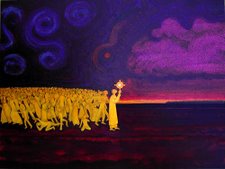
From "TheWesternConfucian"
Capuchin Father Raniero Cantalamessa, preacher to the papal household, asks, "She became poor to serve the materially poor — did she similarly share the sufferings of the spiritually poor?"─The ‘Atheism’ of Mother Teresa. An excerpt:
The world of today knows a new category of people: the atheists in good faith, those who live painfully the situation of the silence of God, who do not believe in God but do not boast about it; rather they experience the existential anguish and the lack of meaning of everything: They too, in their own way, live in the dark night of the spirit.Albert Camus called them “the saints without God.” The mystics exist above all for them; they are their travel and table companions. Like Jesus, they “sat down at the table of sinners and ate with them” (see Luke 15:2).This explains the passion in which certain atheists, once converted, pore over the writings of the mystics: Claudel, Bernanos, the two Maritains, L. Bloy, the writer J.K. Huysmans and so many others over the writings of Angela of Foligno; T.S. Eliot on those of Julian of Norwich.There they find again the same scenery that they had left, but this time illuminated by the sun. Few know that Samuel Beckett, the author of Waiting for Godot, the most representative drama of the theater of the absurd, in his free time read St. John of the Cross.
The word “atheist” can have an active and a passive meaning. It can indicate someone who rejects God, but also one who — at least so it seems to him — is rejected by God. In the first case, it is a blameworthy atheism (when it is not in good faith), in the second an atheism of sorrow or of expiation. In the latter sense, we can say that the mystics, in the night of the spirit, are “a-theist,” that Jesus himself on the cross was an “a-theist”, without-God. Mother Teresa has words that no one would have suspected of her: “They say people in hell suffer eternal pain because of the loss of God. ... In my soul I feel just this terrible pain of loss, of God not wanting me, of God not being God, of God not really existing. Jesus please forgive the blasphemy.”But one is aware of the different nature, of solidarity and of expiation, of this “atheism” of hers: “I wish to live in this world that is so far from God, which has turned so much from the light of Jesus, to help them — to take upon myself something of their suffering.”
The clearest sign that this is an atheism of a completely different nature is the unbearable suffering that it causes to the mystics. Normal atheists don’t torment themselves because of the absence of God. The mystics arrived within a step of the world of those who live without God; they have experienced the dizziness of throwing themselves down. Again, Mother Teresa who writes to her spiritual father: “I have been on the verge of saying — No. ... I feel as if something will break in me one day. ... Pray for me that I may not refuse God in this hour — I don’t want to do it, but I am afraid I may do it.”Because of this the mystics are the ideal evangelizers in the post-modern world, where one lives etsi Deus non daretur (as if God did not exist). They remind the honest atheists that they are not “far from the Kingdom of God”; that it would be enough for them to jump to find themselves on the side of the mystics, passing from nothingness to the All. [link via The New Beginning]



No comments:
Post a Comment